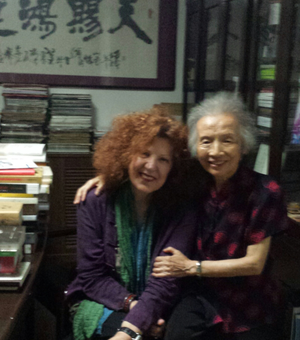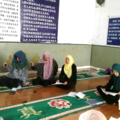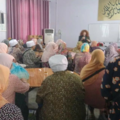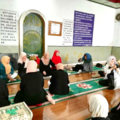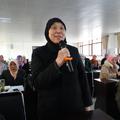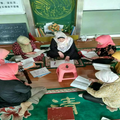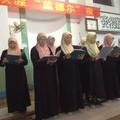Professor Maria H.A. Jaschok
Professor Maria H.A. Jaschok (PhD London/SOAS) formerly Director of the International Gender Studies Centre at Lady Margaret Hall, 2000-2018, she is currently a Senior Research Associate of the Contemporary China Studies Programme in OSGA, and Supervisor and Tutor for Masters in Women’s Studies. She held a Visiting Professorship with King’s College, London, 2019-2021. She is a Life Fellow of the Global China Academy, London.
Maria Jaschok followed the award of her doctorate with a teaching/supervisory position at Zhongshan University, Guangzhou, enabling her to continue fieldwork in Shunde county in Guangdong. Maria’s decision to live in China for a prolonged period was motivated by her conviction (furthermore receiving theoretical and methodological reinforcement through education as a social historian and, importantly, as an anthropologist) that only a prolonged and deep (directly experienced) immersion in Chinese society would facilitate the desired degree of ‘near-instinctive’ familiarity with a country about which she had chosen to teach and conduct research. That conviction shaped subsequent choices in relation to her academic career. It took her from a more conventional appointment as lecturer and director of Chinese Studies at Long Island University, USA, where she set up undergraduate study programs in Taiwan and in mainland China, participating in ambitious projects (when she joined Chinese feminist academics to set up a first international women’s college in China, becoming its vice-principal and professor of gender studies, as well as establish a first Chinese Women’s Museum, where, as its deputy director she initiated a range of research/exhibition projects), and to the directorship of the International Gender Studies Centre in Oxford, where she continued participation in international research projects, including China and Southeast Asia.
Maria’s research interests and topics of investigation have most importantly arisen from her many years of research and life in China, derived from close observations of rapidly (and unevenly) changing moral and political economies, particularly in their gendered manifestations and performances, and from the serendipity of (sometimes fateful) chance encounters and random conversations. Early research and writing focused on kinship, concubinage and domestic servitude in the early twentieth century of a modernizing and industrializing southern China, including the British Colony of Hong Kong, and shifted in the course of time and with change of discursive/research contexts to anthropology of religion (Islam), processes of indigenization under female-led Islamic (but also other religious) institutions and the place and marginality of religious identity in the feminist historiography of China. Long years of close research partnerships and friendships in the field engendered interest in feminist theorizing and ethnographic methodology and led to writing on collaborative modes of cross-cultural research and authorship.
Maria’s most recent participation in a team-led research project (supported by a Leverhulme grant) entailed collaboration with ethnomusicologists and anthropologists of Islam in China with an interest in sensory anthropology. Continuing to work with her Chinese colleague of many years of standing, Shui Jingjun, Maria has produced articles and chapters related to the musical soundscapes of women’s mosques and is currently co-editing a volume on Islam in China and ethnography. She has also commenced work on two books, one is centered on feminist debates surrounding voice, empowerment and silence (utilizing discourse analysis of chants from women’s mosque oral traditions) and the other book entails a return to Maria’s participation in a key moment of Chinese feminism and the attempt by the feminist philosopher and theoretician Li Xiaojiang (around the time of the Beijing World Women’s Congress) to internationalize the HE curriculum and to develop a feminist educational curriculum with Chinese characteristics. (BA/Leverhulme Small Research Grants SRG 2020 to support research for a forthcoming monograph entitled “An Ethnography of Leadership, Movement and Institution-building; the Personal and Political in Chinese Feminism 1993–1995. The time duration of the award: September 2020 – March 2025.)
Maria brought her China research track-record into a research initiative (based at King’s College, London) on patriarchal carvings of female flesh (Patriarchal Inscriptions), embracing historical and contemporary practices, from foot-binding and corseting to scarification, female genital mutilation, body modification, and self-harm. She is right now co-editing a volume of contributions from a series of KCL-hosted webinars, with publication planned for 2023; working title Female Bodies and Patriarchal Inscriptions across Cultural Contexts (under contract).
Current Academic Supervision 2023-2025
Researching: 'I'd Rather Marry a Gay': The Shifting Discourse of Tongqi and Marital Gender Conflicts among Chinese Generation Z (MA in Women/Gender/Sexuality Study)
Researching: Constructing queer, non-binary identities through China's online spaces and communities (MSc in Chinese Studies)
Researching: Playing Games; social alienation, queer desire, and belonging in the virtual world of China's cyberspace (MSc in Chinese Studies)
Researching: Homonationalism, Anti-Imperialism, and the Middle East (Area Studies, MPhil)
Publications
Book: Inside the Expressive Culture of Chinese Women's Mosques -'this turmoil of the soul' (2025) Routledge Contemporary China Series, Routledge.
Chapter: 'Chinese (Hui) Muslim Women’s Mosques, Female Piety, and Ties of Belonging' in The Cambridge Companion to Women and Islam (2025). Edited by Masooda Bano, Cambridge University Press.
Chapter (with Man Ke): 'Muslim Women's Religious and Social Activsm in China' in The Oxford Handbook of Islam and Women (2023). Edited by Asma Afsaruddin, Oxford University Press.
Co-Editor (with U.H. R. Jesmin, T. Levin von Gleichen, C. Momoh) and author of ‘Editorial Introduction’ in The Routledge International Handbook of Harmful Cultural Practices. Routledge, 2023.
Chapter (with Man Ke): 'Muslim Women’s Religious and Social Activism in China', in The Oxford Handbook of Islam and Women, edited by Asma Afsarud. https://doi.org/10.1093/oxfordhb/9780190638771.013.8 Oxford University Press, 2023.
Article: ‘The Sound of Faith: Chinese Women’s Mosques, Islamic Resurgence and Religious Agency’ in Journal for the Study of Religious Experience, 2021, Vol. 7, (3): 93-110.
Book (co-edited and introduction with Rachel Harris and Ha Guangtian): Ethnographies of Islam in China. Honolulu: University of Hawai’i Press, 2021.
Chapter (with Shui Jingjun and Ge CX): ‘Equality, Voice, and a Chinese Hui Muslim Women’s Songbook: Collaborative Ethnography and Chinese Hui Muslim Women’s Expressive History of Faith’ in Ethnographies of Islam in China edited by Rachel Harris, Ha Guangtian, and Maria Jaschok. Honolulu: University of Hawai’i Press, 2021.
Position Paper: ‘Chinese Studies, Scholars, and the Post-Pandemic Turn’ in British Journal of Chinese Studies, 10 (2020). Retrieved from
https://bjocs.site/index.php/bjocs/article/view/84
Article: ‘Religious Agency and Gender Complementarity: Women’s Mosques and Women’s Voices in Hui Muslim Communities in Central China’ in Review of Religion and Chinese Society 5 (2018) 183-207. Leiden: Brill.
Review: ‘Mediating Embodied Protest: Performative Body in Social Protests in the Internet Age in China’ in Media, Culture, and Society. Sage Publisher, 2018. MCS-2018-326.
Monograph (with Shui Jingjun水镜君 and Ge CX葛彩霞) A Muslim Songbook from the Tradition of Women’s Mosques in China. 中原穆斯林妇女赞圣经歌汇编Henan Minzu Publisher, 2017 (in Chinese) neibu print.
Chapter: ‘Hildegard Jaschok in flight’ in Women and War edited by Shirley Ardener, Fiona Armitage and Lidia Sciama. Berghahn Publishers, 2016.
Article (with Man Ke): ‘Covering Body, Uncovering Identity: Chinese Muslim Women’s Vocabularies of Dress, based on fieldwork in Northwest and Central China’ in Comparative Islamic Studies (doi: 10.1558/cis.28236 Comparative Islamic Studies (online) ISSN 1743-1638, 2016).
Article: ‘Sound and silence in Chinese women’s mosques – identity, faith and equality’ in Performing Islam (3) 1&2:59-82. ©2014 Intellect Ltd. doi: 10.1386/pi.31-2.11_2.
Article (with Rachel Harris): ‘Introduction: Sounding Islam in China‘ in Performing Islam (3) 1&2:11-21. ©2014 Intellect Ltd. doi: 10.1386/pi.31-2.11_2.
Chapter: ‘Education, Gender, and Islam in China: The Place of Religious Education in Challenging and Sustaining “undisputed traditions” among Chinese Muslim Women’ contributed to Walking the Tightrope: Asian Muslim Women and their Lived Realities, edited by Huma Ahmed-Ghosh. New York: State University of New York Press, 2015.
Chapter: ‘”Gender-Critical Turns”and Other Turns in Post-Religious and Postsecular Feminisms’ contributed to A Handbook of Gender and Development edited by Janet Momsen and Anne Coles. New York: Routledge, 2015.
Article (with Shui Jingjun): ‘The Culture of “Associational Leadership” in the Hui Muslim Women’s Mosques of Central China’ in Asian Journal of Social Science 42 (2014): 641–656. © koninklijke brill nv, leiden, 2014 | doi: 10.1163/15685314-04205009 .
Entry on ‘Nü Ahong’ contributed to Encyclopedia on Islam and Women, Oxford University Press NY, 2013.
Lead Article (with Shui Jingjun): ‘The Study of Islam, Women, and Gender in China – Taking a Gender-Critical Turn’ Asian Culture. A Journal of the Singapore Society of Asian Studies 37, August 2013.
Chapter (with Shui Jingjun): ‘Chinese Hui Muslim Pilgrims - Back Home from Mecca: Negotiating Identity and Gender, Status and Afterlife’ in The Changing World Religion Map: Sacred Places, Identities, Practices and Politics, edited by Stanley D. Brunn, Springer, 2013.
Chapter (with Shui Jingjun): "'Outsiders Within': Speaking to Excursions Across Cultures" in Researching Gender. Situated Knowers and Feminist Standpoint. Vol.1. SAGE Publications, 2013 (2000, Feminist Theory, 1(1), reprint).
Chapter: 'Women Ahong, Sexual Morality and Muslim Identity in Chinese Consumer Society - claiming the female body' contributed to Women's Empowerment and Sexual & Bodily Rights in Muslim Asia and the Middle East edited by Homa Hoodfar and Anissa Helie. Zed Books, 2012.
Chapter: ‘Sources of Authority: Female Ahong and Qingzhen Nüsi (Women’s Mosques) in China’ contributed to Women, Leadership and Mosques: Changes in Contemporary Islamic Authority edited by Masooda Bano and H. Kalmbach, Brill, Leiden, 2012.
Entry on ‘Political-Social Movements: Community-Based: China’ contributed to Encyclopedia of Women and Islamic Cultures (EWIC), Online Edition. Koninklijke Brill N.V., 2012.
Book (with Shui Jingjun): Women, Religion, and Space in China, Routledge NY, 2011.
Article: ‘Education, Gender and Islam in China: the place of religious education in challenging and sustaining “undisputed traditions” among Chinese Muslim women’, co-written with Hau Ming Vicky Chan, International Journal of Educational Development as part of Special Issue on ‘Education in China’. 2009. 
Article: ‘Chinese Hui Muslim Women At Home: tradition, dignity and modernization in a global context’ in Diskus (10), 2009. http://www.basr.ac.uk/diskus/diskus10/jaschok.htm
Article: ‘Qiayi’ (Qiayi, Uighur Muslim women’s traditions of organizing), co-written with Xu Lili, in Minzu Yanjiu (Academic Journal for the Study of Ethnic Minorities). 2009, January.
Article: ‘NIAS in the feminist imagination: Situating an ‘unconventional’ scholarly life’ in nias nytt Asia Insights. No. 2, 2008. September.
Article: ‘Women’s Mosques Education, Female Ignorance and Chants to Save Souls; Chinese Hui Muslim Women Remembering Jingge, Remembering History.’ In Studies in Adult and Community Education, (52). The Japan Society for the Study of Adult and Community Education, Tokyo, 2008.
Article: ‘Ethnographic “World-Travelling”: Of Passages and Boundaries, of Aspirations and Differences’ in Outskirts. feminisms along the edge (17) 2007.
Chapter: ‘Xingbie, Zongjiao, Xiao Chuantong’ (Gender, Religion and Little Traditions) in Gonghe Shidaide Zhongguo Funü. Edited by You Jianming, Luo Haijun, Shi Ming. Rive Gauche Publishing House, Taiwan. 2007. [Rev. Chinese edition of Women in China. The Republican Era in Historical Perspective. 2005]
Chapter: ‘Thinking the Unheard, Writing the Unwritten – Collaborating the Feminist Way’ in Fashioning Identities and Weaving Networks. Edited by Bryceson, Okely, Webber. Berghahn, Oxford, 2007.
Article (in Chinese): ‘Changes in Women’s Organization and Action, Changes in Women’s Public Spaces’ in Zhongguo Nüxingzhuyi (Feminism in China). Co-authored with Shui Jingjun. Edited by Huang Lin. Guangxi Normal University Press. 2006.
Twelve entries regarding female religious culture in Chinese Islam for Encyclopedia of Contemporary Chinese Culture, RoutledgeCurzon, London, 2005.
Article: ‘Religious Women in a Chinese City: Ordering the past, recovering the future – Notes from fieldwork in the central Chinese city of Henan’ in Kvinder Køn & Forskning. Nos 1-2, Copenhagen, 2005.
Chapter: ‘Gender, Religion, and Little Traditions: Chinese Muslim Women Singing Minguo’ in Women in China. The Republican Era in Historical Perspective. Edited by Mechthild Leutner and Nicola Spakowski. Berlin: Litt Verlag, 2005.
Article (in Chinese): ‘Kua jie yan shuo- shuxie chenmode lishi’ (Speaking across boundaries – writing muted history) in Bolan Qunshu, June issue, 2003.
Article: ‘Violation and Resistance: Women, Religion and Chinese Statehood’ in Violence Against Women, special issue, SAGE Publishers, 2003
State of the field article: ‘Sources and methods for research on women and Islamic cultures in China, 1700-1900’ in Encyclopedia of Women and Islamic Cultures Volume I Brill, Leiden, 2003
Dictionary entries: Co-authored with Shui Jingjun: "Ba Nu Ahong", "Du Shuzhen Ahong", "Yang Huizhen Ahong" in Biographical Dictionary of Chinese Women. 4 vols. Edited by Lily Xiao Hong Lee. M.E. Sharpe Publishers, 2003
Book, co-authored with Shui Jingjun (in Chinese, revised for Chinese version): Zhongguo Qingzhen Nüsishi (The History of Women's Mosques in Chinese Islam). Beijing: Sanlian Chubanshe, Harvard-Yench'ing Academic Library Series, 2002
Book, co-edited: Chinese Women Organizing; cadres, feminists, muslims, queers. Oxford: Berg Publishers. 2001
Book: Co-authored with Shui Jingjun: The History of Women’s Mosques in Chinese Islam: A Mosque of Their Own. Richmond: Curzon Press. 2000
Article: 'The Communist Party, Allah and Women's Liberation: The Place of Religious Life in the History of Chinese Women" in Nordic Newsletter of Asian Studies. No. 2. June Issue. 2000
Article: Co-authored with Shui Jingjun: "'Outsiders Within': Speaking to Excursions across Cultures" in Feminist Theory. Vol.1. No.1. SAGE Publications. 2000
Encyclopedia Entry: “Concubinage: China” in Encyclopedia of Slavery. Edited by Paul Finkelman & Joseph C. Miller. New York: MacMillan 1999
Review Article: “Gail Hershatter: Dangerous Pleasures; Prostitution and Modernity in Twentieth-Century Shanghai” in China Review International. Honolulu, HI: University of Hawaii, 1998 (September)
Chapter: “Kua Wenhuade Tan Xun: Xifang Shiye Zhongguo Funu Yanjiu” (On a Cross-Cultural Journey - Reflections on Chinese Women’s Studies in the West) in Funu Yanjiu Yundong: Zhongguo Ge An. Edited by Li Xiaojiang. Hong Kong: Oxford University Press 1998
Chapter: “Chinese Educational Reforms and Feminist Praxis: On Ideals, Process, and Paradigm” in Beyond the Face of Reforms: Modernizing Chinese Higher Education for the 21st Century. Edited by Michael Agelasto and B. Adamson. Hong Kong University Press 1998
Chapter: “On Colonies, Colonials, and the Colonized: Contextualizing Women’s Studies in Hong Kong” in Gender Perspectives of the Hong Kong Society. Edited by Fanny Cheung. Hong Kong: The Chinese University Press 1997
Chapter: "On the Construction of Desire and Anxiety: Contestations over Female Nature and Identity in China's Modern Market Society" in Women and Market Societies. East and West: Re/Production, Consumption, Representation. Edited by Barbara Einhorn and E. J. Yeo, Sussex University, Center of Research on Women. London: Edward Elgin 1995
Book: Co-edited with Suzanne Miers: Women & Chinese Patriarchy; Submission, Servitude and Escape. Zed Books, London and Hong Kong University Press, Hong Kong 1994
Chapter: Co-authored with Suzanne Miers: “Women in the Chinese Patriarchal System: Submission, Servitude, Escape and Collusion” in Women & Chinese Patriarchy; Submission, Servitude and Escape.
Chapter: “Chinese ‘Slave’ Girls in Yunnan-Fu: Saving (Chinese) Womanhood and (Western) Souls, 1930-1991” in Women & Chinese Patriarchy; Submission, Servitude and Escape
Chapter: Co-authored with Suzanne Miers: “Epilogue: Traditionalism, Continuity and Change” in Women & Chinese Patriarchy; Submission, Servitude and Escape
Article: "Die andere Haelfte der Welt. Das Frauenmuseum in Zhengzhou" in Das Neue China, Berlin. No. 4. August 1991
Chapter: "Zhongguo Xiandaihua Yu Funu Shenghuode Gaibian" (The Impact of China's Modernization on Women's Lives) in Huaxia Nuxing Zhi Mi. Edited by Li Xiaojiang. Beijing: Sanlian Shudian 1990
Book: Concubines and Bondservants London: Zed Books/Hong Kong: Oxford University Press 1988
Numerous review articles, as for The British Journal of Sociology, Journal Of Human Rights, The Journal of Islamic Study, China International Review, Frontiers, Review of International Studies, Women And Gender in Chinese Studies Review (e-reviews)
Email: maria.jaschok@area.ox.ac.uk
- Anthropology
- Gender Studies
- Gender & Development
- Anthropology of Religion
- Oral history, marginality and identity, feminist intersectionality, religious authority and gender, feminist methodologies and cultural travelling, sociology of the body, ethnography and other histories
- China, Myanmar, translocal spaces
Link for a full list of publications jaschok_publications_osga_website.pdf
Visual Notes from a China Scholar’s Studio. 10 December 2019
Writing has finally commenced in earnest on a monograph which carries the working title of ‘Gendered Voices and Religiosity in a Chinese Muslim Soundscape.’ Like most early writing, the title suffers from an overly long sub-title, ‘aspiration, sacrifice, resilience, and revival in the expressive culture of Hui Muslim women’s mosques.’ There is a long road to travel before this all sees the light of print! And thus, from en route, a few images from several years of fieldwork in central China, with photos taken by members of a large research group. These are images integral to my writing, affording, I hope, at least a glimpse of an intellectual space that currently so preoccupies me.
Following recent completion of research collaboration on ethnographies of Islamic soundscapes, a study of women’s religious voices, empowerment and traditions of silence in the context of Islamic resurgence in China, the monograph will complete a trilogy on Chinese women’s mosques. It centres specifically on feminist debates surrounding embedded theorization and local histories of women’s voices, empowerment and silence, utilizing discourse analysis of chants from women’s mosque oral traditions. Whereas the first two books were written in partnership and on-going consultation with Shui Jingjun, this third book will carry the heavier imprint of my gaze and thus of its situated partiality.
The images I share come from the final year of research observation/participation in central China. A collective initiative came into being to record hitherto unrecorded chants from the tradition of women’s mosques for a Muslim women’s Songbook of Chants. It became a project in which countless women and their leading ahong from diverse mosques in and around Henan Province participated to ensure as successful and comprehensive a record of their history as was possible. This required extracting women’s voices from an apparently overpowering, dominant patriarchal soundscape. Its purpose, successfully accomplished, was to bring women’s inaudible past within the hearing and reach of future generations.
Silence harbours, so feminist scholarship recognizes, many possible permutations of thought and action. Influenced by philosophies of epistemic injustice as well as feminist and postmodern theorizing of silence and voice, I am asking out of which silence has emerged a history, a culture of sustained belief and female religious identity that by their very presence ask us to query negative assumptions commonly associated with imaginaries of women in organized religion.


